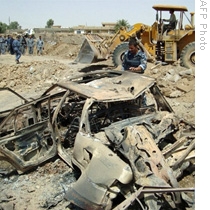Cairo
01 September 2009
 |
| Iraqi officers inspect the scene following a car bomb in Shirqat, 100 kms north of the city of Tikrit, 29 Aug 2009 |
August was an extremely bloody month in Iraq, according to an Iraqi government report, with casualties from violence among Iraqi civilians, police and Iraqi soldiers hitting a 13-month high.
The toll in August contrasts with a relative lull in July, when 275 Iraqis were killed in the weeks immediately following the withdrawal by U.S. forces from Iraqi towns and cities.
A catastrophic pair of back-to-back truck bombings in the center of Baghdad on August 19 were responsible, in part, for the dramatic increase in casualty figures.
Those bombings also set off a political firestorm, with the Iraqi government accusing neighboring Syria of facilitating the entry of terrorists.
Political Science Professor Khattar Abu Diab, of the University of Paris III, says the bombings and accusations of Syrian involvement came just after an attempt by Iraqi Prime Minister Nouri al-Maliki to begin a rapprochement with Damascus.
He says that the big surprise is that the bloody bombings on August 19 in Baghdad took place just several days after a visit by Prime Minister Maliki to Syria and the signing of a strategic agreement between Baghdad and Damascus.
He says following the blasts the Iraqi government went on to accuse Syria of funneling terrorists into the country since 2004. It is not clear, he underlines, if Syria and ally Iran are both trying to destabilize Iraq or if the two allies are following different policies. He says some analysts are also accusing Saudi Arabia, Egypt and even Jordan of responsibility for the violence.
Khadido Khalaf Aido, who is a member of the security commission for Nineveh Province that includes the violence-prone city of Mosul, says Iraqi security forces need better equipment to put a stop to all the bombings.
He says the security situation is worse than we had hoped it to be, with frequent violence and bombings in small towns and villages. He argues that more sophisticated equipment is needed along key roads, so security forces can detect car-bombs and other explosives.
Iraqi Prime Minister Maliki decried the massive August 19 bombings in Baghdad, calling them "a desperate attempt to derail the political process and influence parliamentary elections," set to be held in January 2010.
Khattar Abu Diab argues that both the Iraqi government and the prime minister have found themselves in a difficult position since the U.S. withdrawal from Iraqi cities on June 30, and adversaries of Mr. Maliki from within his own party are trying to unseat him as prime minister.